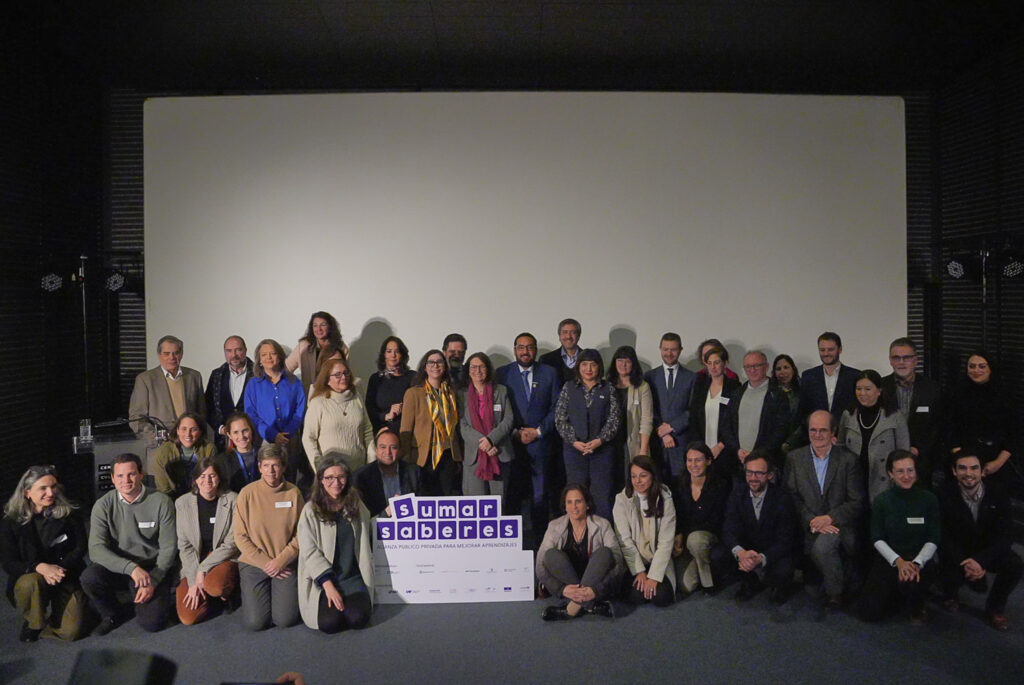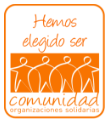- The alliance brings together more than twenty-five institutions and groups, including international organizations, foundations specialized in educational improvement, study centers and support networks for educational improvement.
- Sumar Saberes will create a nationwide map with programs to support the improvement of learning and will identify which initiatives work and what are the keys to their effectiveness, to help educational communities make decisions based on the available evidence.

With the aim of presenting the new public-private partnership Sumar Saberes, the Ministry of Education and Fundación Chile met on Tuesday, May 28 at the Cineteca of the La Moneda Cultural Center, before a large audience made up of government authorities, teachers, directors, students and representatives of educational institutions. This innovative initiative includes a wide range of actors, including international organizations, study centers, foundations and support networks specialized in educational improvement.
Its purpose is to promote significant progress in education, identifying and promoting effective initiatives that support the improvement of learning in schools. This will allow school communities to know what really works and make decisions based on the available evidence, which will also contribute to increasing the effectiveness of investment in education.
Currently, the alliance is made up of the Anglo American Foundation, the BHP Foundation, the Opportunity Educational Foundation, the Luksic Foundation, the MC Foundation, UNESCO, UNICEF, the IDB, CAF, the UC Center for Public Policy, the Center for Advanced Research in Education of the University of Chile (CIAE), the Directorate of Public Education and the Quality Assurance Agency. It is also supported by the Oxford University's Hub for Global Education "What Works".
In June 2023, the Council for Educational Reactivation, convened by the Ministry of Education, presented a report with recommendations to enrich the strategy to address the great challenges presented by our education system and that were exacerbated by the pandemic. One of his suggestions was to "develop an observatory that registers and systematizes experiences reported as effective for the improvement of learning at all levels and subjects" at the national level and also "make them available to the educational system as recommendations for training practices, creating an evidence-based repository." This recommendation prompted Fundación Chile and the Ministry of Education to form Sumar Saberes.
"We are at a very important moment, at a turning point for what is to come. The challenge of reactivation is long-term, how do we project this process of educational transformation, that the learning results are consistent with the investment capacities that the country has in education," said the Minister of Education, Nicolás Cataldo.
"Sumar Saberes is an initiative that seeks public-private collaboration to face the challenges that the educational system has for the future. We are very interested in being able to explore all the good that is being done in educational establishments and kindergartens, to learn about the experience, study it, collect evidence and based on the evidence, scale those that are more significant and that can have a greater impact on learning outcomes," added the authority.
"At Fundación Chile, we feel deeply represented by this purpose and very proud to be able to promote an alliance that installs collaborative innovation between various actors and public and private institutions as a modality of work at the service of improving learning," said Valentina Quiroga, Human Development Manager of Fundación Chile.
Despite advances in Mathematics and Reading, there are still gaps in education in Chile. This was demonstrated by the SIMCE 2023, an instrument that detected that in 4th grade the percentage of insufficient level in Mathematics was 38% and in Reading 29%. Meanwhile, in middle II, the percentage of insufficient level in Mathematics was 51%, and in Reading 50%.
"It is urgent to promote a leap in education, promoting effective evidence-based initiatives, through a culture of collaboration that benefits educational communities, identifying which support initiatives work, what conditions enable their success, how they are implemented in diverse contexts, how they are scaled and made sustainable, to support decision-making," explained Nicole Cisternas, Director of Education at Anglo American.
Isabella Luksic, general manager of the Luksic Foundation expressed that the role of evidence becomes crucial today: "As active participants in the program development ecosystem, it is an ethical imperative that we constantly question whether we are generating a significant social impact. Evaluation not only makes it easier for organizations to achieve greater social impact, but it also gives us the opportunity to learn and reflect on what aspects need to be maintained."
In the first stage, the alliance will create a nationwide map with programs to support the improvement of learning and will identify which initiatives work and what conditions enable their success. It should be noted that Sumar Saberes will work so that methodologically the points of view of students and teachers are included in the survey, because their voice is fundamental throughout the process.
In this regard, the executive director of Fundación Educacional Oportunidad, Marcela Marzolo, stated that "from the work we will do, it will be possible to make visible those initiatives that have evidence for the improvement of student learning, making them available to both public policies and organizations of society, in pursuit of the integral development of children, girls and young women".
In turn, Sumar Saberes will seek to project a next phase, to advance in the sustainable scaling of those effective initiatives for the improvement of learning, said Alejandra Garcés, director of the BHP Foundation: "We hope that this laboratory will be useful as a guide for decision-making in the educational field, both at the level of public policies and in the schools themselves. We want initiatives that give good results to be scaled up, to promote systemic change that transforms education and provides tools for the needs of the future."
Finally, Alejandra Grebe, executive director of Fundación MC, concluded that "participation in the alliance is a good opportunity to work collaboratively on an issue of interest to the country, with key and transversal actors in the field and, particularly, with foundations that share a common purpose."
In addition to the institutions already mentioned, the alliance is made up of a Network of Alliances that will collaborate to fulfill the purpose and mission of Sumar Saberes. To date, it is made up of Collective Action for Education, the network For a Chile that Reads, the National Corporation of Private Schools of Chile (Conacep), Collective Effect, Public Good, Early Education 2030, the Federation of Private Education Institutions (FIDE), the Association of Regional Governors of Chile (Agorechi), the Chilean Association of Municipalities (ACHM), Arauco Foundation and Natura Institute. One of the objectives of Sumar Saberes is to continue growing and for more entities to join this alliance to fulfill its purpose.





